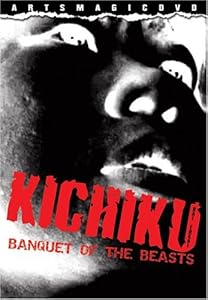Gored to death…
Otherwise known as BANQUET OF THE BEASTS, the movie is based upon the Asama-Sanso Incident. During a ten day siege in 1972 at Karuizawa, members of the United Red Army (URA) turned against themselves, resulting in a blood bath. And in KICHIKU DAI ENKAI, the blood bath’s ultimately explored in great lengths.
Some may trash Kazuyoshi Kumakiri’s film as a slow moving student project, but that’s needlessly harsh. Yes, the movie is slow, but in a very arthouse sort of way, and what sometimes seems to be an homage to David Lynch. However, this does not mean the characters are any less compelling, even if the story does lack a bit.
As for the tale, a political group waits for its leader to return triumphantly from jail. In the meantime, his girlfriend, played by Sumiko Mikami in her only film role, keeps the home fires burning by fucking the guys in the crew and bullying them. Then she snaps, which leads to torture, blood, muck, rape, penal removal, and even more carnage.
The acting’s strong, the special makeup effects are quite impressive, and KICHIKU DAI ENKAI certainly ends up fittingly in the category of “disturbing cinema” – thanks to a few compelling scenes, especially one involving Mikami at the mercy of a fellow cohort and a ready to blow shotgun.
In a way, much like George Lucas’s THX 1138 (1971), KICHIKU DAI ENKAI attracted others upon Kumakiri’s graduation from film school, and he has gone on to helm eleven more feature projects to date. Granted, he’s not an overblown multi-millionaire out to destroy his original work, but this film brought the young director much recognition in his native country.
Before I had learned about the link to the aforementioned URA incident, I was enamored on a thematic level, and thought Kumakiri chose to comment on his generation and its lack of vision thanks to an overwhelming sense of apathy and disdain for the status quo. With the climax, it seemed to be a comment that the disintegration of intellectual youth would lead to a bloody end of Japan. Then again, even without the tie in to actual events, the themes hold up, as well as the director’s fear of Japan’s future.
KICHIKU DAI ENKAI is far from perfect, mostly due to pace and some issues regarding narrative structure, but the movie will not disappoint those who enjoy violence and gore – or want to see one of those films labeled as “forbidden fruit” by the masses.
Here’s one for the old college try.
3 out of 5 stars

